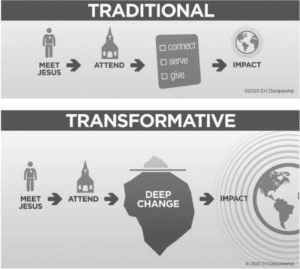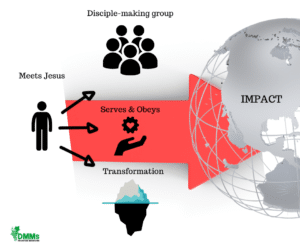Is it possible to be both deeply committed to emotionally healthy discipleship and also to the rapid multiplication of disciples? It’s an important question worthy of consideration. Can natural fruit grow fast without being eaten by worms? I’m not saying it’s easy. Is it possible?
We live in a world that tends to divide into camps. It’s an either/or world. Jesus wasn’t like this. In fact, He refused to be put in one camp or the other.
Jesus was not Democrat or Republican, or Independent for that matter. Please excuse the reference to American politics, but it so clearly illustrates our tendency toward joining a camp and being loyal to it without learning from and understanding others who are in a “different camp.”
Spoiler alert. I’ll answer my question now.
Yes, it is absolutely possible to be committed to both of these things. How do I know this? Because Jesus was. He is our model on how to make and multiply disciples rapidly and in healthy, sustainable ways.
Four Failures
Peter Scazzero’s books have had a significant impact on my life. Shortly after going through a season of marital conflict and depression, I came across Emotionally Health Spirituality. Many of the lessons he referred to in the book mirrored my own learning during that season of my life.
Later, I also read Emotionally Healthy Church, Emotionally Healthy Leader and am in the middle of reading Emotionally Healthy Discipleship, Pete’s newest book. Through the years certain authors have “mentored” me through their writing. Peter is one of them.
In his recent book, he writes about four failures in discipleship.
1. We tolerate emotional immaturity.
2. We emphasize doing for God over being with God.
3. We ignore the treasures of church history.
4. We define success wrongly.
These are well worth considering as we pursue Disciple Making Movements (DMMs). In this brief article, I won’t have time to discuss them all in-depth. Check out his book for more details on these. There are some things from his book I completely affirm. Let me highlight a few.
Healthy Discipleship Necessities
- Focus on people, not only meetings.
We need to be willing to disciple people, not just multiply meetings. I’ve said it over and over, discipleship is not a meeting. You may have 13 disciple making groups or Discovery Bible studies going each week. Without genuine loving relationships happening in those groups, life transformation will not happen. It is easy to spread yourself too thin relationally and not have time to go deep in loving people.
Disciple making movement practitioners must learn to be multi-relational, while still going deep with a few. How did Jesus do this? He had an inner circle of people He invested heavily in. He ate with them, walked with them, and took them with him when he did ministry. It was far more than a weekly one-hour Bible study. It was those men through whom He multiplied Himself and what became the Church.
Jesus both went broad and deep. So must we.
2. Track growth, but never prioritize it over abiding in Jesus.
Scazerro says in the section of his book on wrongly defining success, “I’m not saying that it’s inherently wrong that we measure our progress by the numbers. The problem comes when numbers are the only thing we measure, and so become our ultimate marker of success…All numerical markers—increased attendance, bigger and better programs, a larger budget—must take a backseat to listening to Jesus. Jesus calls us to abide and abound in him (John 15:1–8).”
I am a big advocate for tracking growth. Why? Because without it we can’t be good stewards. Nor can we see whether or not we are seeing multiplication or just experiencing addition growth.
If we begin to focus more on our numbers than on Jesus, we’re in trouble! If we start to define our success by whether or not we’ve reached fourth generation growth, red flags should be waving. Our success is directly related to our obedience to what we hear Jesus saying to us as we abide in Him. Period.
When I first began my DMM and church multiplication journey I spent months researching some of the failures of movements. I looked at movements in the Muslim world where friends said people were not genuinely giving allegiance to Christ over Mohammed. Researching the tragedy of ethnic conflict in Rwanda, a nation that had experienced rapid church growth, was sobering. How could we disciple people to follow Jesus and experience His transformation in our lives while still addressing the urgent reality of the millions who have never heard of Christ’s love? The question burned in my heart.
Hold Both as Priorities
Jesus loved the lost. He was concerned about reaching them. It was not His desire or will that any would perish. I’m convinced that the gospel has not spread rapidly because we have not been as concerned about the lost as Jesus is. We’ve failed to obey His command to make disciples who obey.
The urgency of reaching the millions who have yet to hear the gospel compels me to find a different way to do church than the traditional model. Its growth is just too slow to match population growth among the unreached. If we don’t embrace changes, a more multiplicative model, millions and millions will continue to go into eternity having never had a chance to hear of the Savior’s love and desire to save. This is not acceptable.
Nor is it acceptable to be so focused on our inward life that we delay obedience to Christ’s command to make disciples. Abiding in Jesus, practicing solitude, silence, lives of prayer, and sharing our testimony with neighbors, friends, and relatives are equally part of obeying Christ.

This graphic seems to say we must have deep change before we can have an impact. This was not the way Jesus discipled. Deep change and transformation happened simultaneously.
Instead, as we look at how Jesus made disciples, we see that they were with Jesus in a group, they immediately served and obeyed (He sent them out in Luke 9 and 10), and transformation was an ongoing process.

Having discipled many toward maturity and transformation, I’ve consistently seen that those who pass on whatever I’ve been teaching them to others mature more rapidly. They immediately begin to have an impact on their Oikos, even before they are mature or have been fully transformed. It would be a mistake to think we have to wait until we have all our issues worked through before we can begin to impact the world.
Discuss With A Friend
I’ll write more about this in a future blog. There is much for us to consider as we carefully think through these issues.
Talk with your team or a friend about this. Share this blog with them perhaps.
How do we hold these two priorities as important? Is it possible to multiply disciples rapidly? While still doing it in an emotionally healthy way that leads to deep transformation?
Share your ideas about emotionally healthy discipleship below in the comments. Or join our DMM Facebook group to discuss this there if you don’t already have others you can talk to about this.




Comments
Thanks for this. Love the comparison of the three pictures and what they describe. Very helpful.